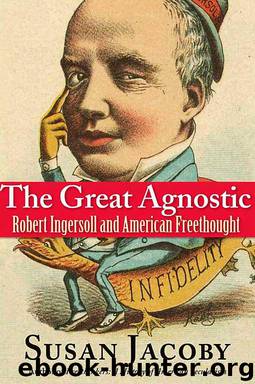The Great Agnostic by Susan Jacoby

Author:Susan Jacoby
Language: eng
Format: mobi
Publisher: Yale University Press
Published: 2013-11-24T22:00:00+00:00
VI
Reason and Passion
Not till the sun excludes you, do I exclude you.
—Walt Whitman, “To a Common Prostitute”
Allusions to this famous, once-scandalous Whitman poem occur many times, in many contexts, in Robert Ingersoll’s lectures, essays, and interviews. His attachment to this particular line of American verse explains, on an even deeper level than his advocacy of science, secularism, and the separation of church and state, why the word “great” was appended to the informal title used not only by his admirers but by his more open-minded critics. Then as now, freethinkers, secularists, agnostics, and atheists—whatever they call themselves or others choose to call them—were often portrayed by their religious enemies as cool, uncaring skeptics who had nothing but contempt for the emotional needs served by religion. If the freethinkers were right, and there was no benevolent creator, no reason for suffering, no eternal life, what, then, would comfort the grieving and the afflicted? Even the tough-minded suffragist and agnostic Susan B. Anthony wondered whether “if it be true that we die like the flower, leaving behind only the fragrance … what a delusion has the race ever been in—what a dream is the life of man.”1 To such existential questions, Ingersoll did not offer reason and the search for truth as their own rewards (although he did consider them greater blessings than any promise of eternal life). Instead, he offered the emotional argument that finitude is what gives this life meaning. In a graveside eulogy for a friend’s child, he told the mourners, “If those we press and strain within our arms could never die, perhaps that love would wither from the earth. May be this common fate treads from out the paths between our hearts and the weeds of selfishness and hate. And I had rather live and love where death is king, than have eternal life where love is not. … They who stand with breaking hearts around this little grave, need have no fear. The larger and nobler faith in all that is, and is to be, tells us that death, even at its worst, is only the perfect rest.”2 By referring to faith in what “is to be,” Ingersoll was not implying that he believed in eternal life or otherworldly reunions with loved ones—even though, as a proper agnostic, he simply maintained that there was no evidence of an afterlife and that the ancient longing of human beings for immortality had no bearing on the question. Ingersoll’s eulogies, which always emphasized that the dead, in a state of “perfect rest,” could feel no pain and sorrow, appealed to many liberal religious believers as well as freethinkers, because one of the distinctive characteristics of modernizing forces within American Protestantism was less emphasis on divine punishment.*
In all of the earthly matters he considered most important, Ingersoll saw no conflict between emotion and reason, between passion and rationality—unless emotion and passion were subordinated to rigid ideology of either a religious or secular nature. His insistence that passion and reason must
Download
This site does not store any files on its server. We only index and link to content provided by other sites. Please contact the content providers to delete copyright contents if any and email us, we'll remove relevant links or contents immediately.
Fanny Burney by Claire Harman(25784)
Empire of the Sikhs by Patwant Singh(22173)
Out of India by Michael Foss(16312)
Leonardo da Vinci by Walter Isaacson(11903)
Small Great Things by Jodi Picoult(6095)
The Six Wives Of Henry VIII (WOMEN IN HISTORY) by Fraser Antonia(4791)
The Wind in My Hair by Masih Alinejad(4424)
The Lonely City by Olivia Laing(4120)
The Crown by Robert Lacey(4105)
A Higher Loyalty: Truth, Lies, and Leadership by James Comey(4033)
The Iron Duke by The Iron Duke(3639)
Millionaire: The Philanderer, Gambler, and Duelist Who Invented Modern Finance by Janet Gleeson(3569)
Sticky Fingers by Joe Hagan(3454)
Alive: The Story of the Andes Survivors by Piers Paul Read(3312)
Papillon (English) by Henri Charrière(3270)
Joan of Arc by Mary Gordon(3259)
Stalin by Stephen Kotkin(3086)
Aleister Crowley: The Biography by Tobias Churton(3021)
Ants Among Elephants by Sujatha Gidla(2925)
